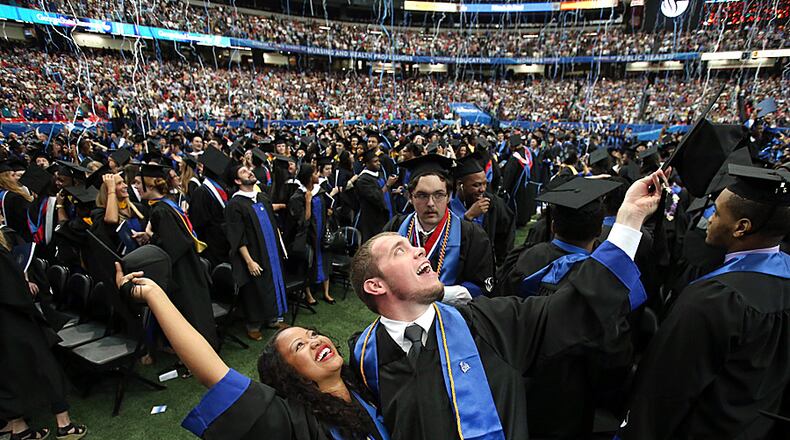Nearly 1.5 million Georgians owe an average of slightly more than $30,000 in federal student debt — the highest of the nation's 50 states and trailing only Washington, D.C., according to data released by the White House.
Those numbers come as the Obama administration this week unveiled its "Student Aid Bill of Rights," which was the centerpiece topic during the president's trip to Atlanta on Tuesday.
Total student debt nationwide has more than doubled since the start of the Great Recession, according to the Wall Street Journal. And the WSJ notes that data show the burden varies wildly, from 114,000 North Dakota residents owing an average of $22,379 in federal student debt to 140,000 D.C. residents owing an average of $40,885.
These numbers refer to estimated balances from either Direct Loans or Federal Family Education Loans as of January.
Georgia is second in average debt per borrower, with 1.45 million residents owing an average of $30,443. The state is also ninth nationally in total number of borrowers and eighth in total outstanding debt ($44.3 billion).
In 2013, Atlanta was highlighted for its high debt load.
A variety of factors inform this variation, such as average cost of public and private universities, and median household income. In terms of total borrowers and total outstanding debt, Georgia is more in line with similarly sized states (Michigan, North Carolina and Ohio) and trails states such as California, Texas and New York.
The AJC's Janel Davis reported last year that the average one-year cost for a new full-time student at a public four-year institution was $18,500 in Georgia in 2010-2011, according to data from the Southern Regional Education Board.
About 59 percent of Georgia students graduate with some kind of loan debt, Tim Renick, vice provost at Georgia State University, told Davis.
In his speech at Georgia Tech, President Barack Obama called for renewed scrutiny, and the possibility of new regulations, to improve the experience of federal student loan borrowers.
"I believe that America is not a place where higher education is a privilege that is reserved for the few," he said. "America needs to be a place where higher education has to be available for every single person who's willing to strive for it, who's willing to work for it."
About the Author




